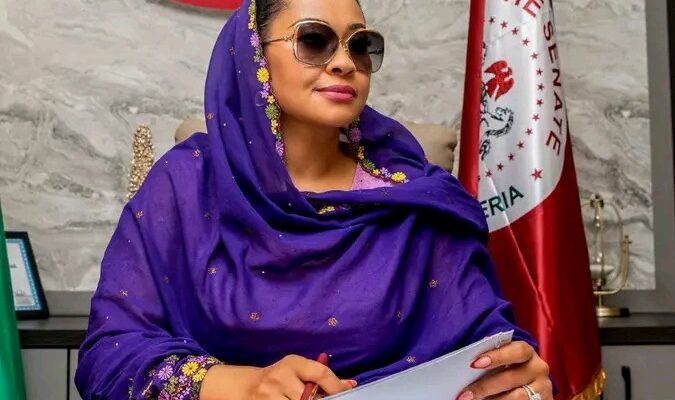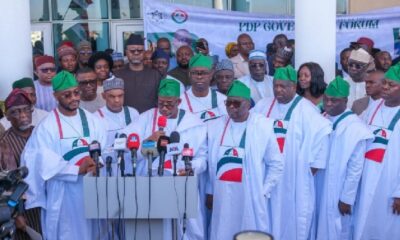News
Govt palliative worsening food inflation, says Cardoso

By Kayode Sanni-Arewa
The Governor of the Central Bank of Nigeria, Olayemi Cardoso, has said that the huge purchase of foodstuffs by the government as palliatives is contributing to the galloping food inflation in the country.
He stated this in his contributions during the March Monetary Policy Committee, which was published on the website of the CBN.
The MPC increased the benchmark interest rate to 24.75 per cent, from 22.75 per cent.
The committee had said that its hawkish stance was to tackle inflation.
However, the country’s inflation rate accelerated to 33.2 per cent in March, with the food inflation rate reaching 40.01 per cent, a year-on-year increase of 15.56 percentage points from 24.45 per cent in March 2023.
According to the National Bureau of Statistics, the surge in food inflation could be attributed to rising prices for items such as garri, millet, yam tuber, water yam, and others.
Following the removal of fuel subsidy, the Federal Government approved N5bn for each state and the Federal Capital Territory to enable them to procure food items for distribution to the poor in their respective states.
In his comments, the CBN governor noted that inflationary pressure had failed to abate despite the hike in the interest rate in February.
He said, “Despite notable stability in the foreign exchange market resulting from decisions taken at that 293rd MPC meeting, inflationary pressure remains unabated. While there is the argument that the significant tightening since the last MPC meeting is yet to fully permeate the system and yield its expected impact, the risk of galloping inflation persists. If such a hyperinflationary scenario is to become reality, available options to control inflation could be severely constrained. From the facts presented to the MPC, there is a clear indication that the monetary factors contributing to inflation are diminishing in their significance.
“This could be considered as evidence of the impact of decisions reached at the 293rd MPC meeting. Staff reports show that the principal drivers of acceleration in inflation are hikes in food and energy prices which are associated with structural factors. Further, new dimensions of inflationary pressure are emerging. First, ‘seller inflation’ arising from the oligopolistic structure of commodity markets such as noticed in the prices of local commodities is gaining significance. In addition, huge purchases by the government for distribution as palliatives to vulnerable citizenry is adding another dimension to the food price inflation, with seasonal factors of food price increases during religious fasting and festive periods, adding price cyclicality
He further said that the new sources of inflation were better addressed by the fiscal authorities to complement the efforts of monetary policy.
Another member of the committee, Bala Bello, echoed a similar sentiment about the rising inflationary trend, saying, “Both food and core inflation rose in February 2024, underpinning acceleration in headline inflation to 31.70 per cent in February 2024 from 29.90 per cent in the previous month. This continued rise in inflation was mainly due to persisting high production costs, lingering security challenges and exchange rate pressures.
“Inflation is currently unacceptably high and requires decisive and coordinated efforts to curb it, given its adverse impact on citizens’ purchasing power, investment decisions and broad output performance.
According to Bala, the Federal Government’s initiatives at addressing food insecurity, such as the release of grains from the strategic reserves, distribution of seeds and fertilisers, and support for dry season farming, are important and commendable.
News
Lawmaker Slams NBA Over Rivers Crisis, Demands Return of N300m

News
BREAKING: Unknown gunmen reportedly storm Senator Natasha’s family residence

Senator Natasha Akpoti-Uduaghan’s family residence in Kogi was reportedy invaded by gunmen around 1 a.m. on Tuesday, April 16, leaving damaged windows but no injuries.
The incident happened at her hometown residence in Obeiba-Ihima, located in Okehi Local Government Area of Kogi State.
Sources familiar with the event said the attackers arrived around 1:00 a.m. Armed with cutlasses and guns, they damaged parts of the building, smashing windows and causing panic in the area. At least three men were involved in the attack.
Senator Natasha’s Chief Security Officer, Yakubu Ovanja, quickly informed the appropriate security agencies.
In response, officers from the Okehi Police Division rushed to the scene.
Although nobody was hurt and no suspects have been arrested yet, security officials recorded the extent of the damage and launched a preliminary investigation.
The reason behind the attack is still unknown, and as of now, Senator Akpoti-Uduaghan has not released any official statement. She represents Kogi Central in the Senate and is known as a vocal figure in Nigerian politics.
According to Zagazola Makama, police are still trying to figure out what motivated the attackers and are working to find those responsible.
News
SAD! Again, Alleged Herdsmen Attack Three Benue Communities

The communities came under simultaneous attacks just a day after the killing of 11 persons at Otobi Community also in Otukpo LGA.
Benue has in the past decade experienced incessant attacks.
Suspected herdsmen have again stepped up violent attacks as no fewer than three communities in the Otukpo Local Government Area (LGA) of Benue State were attacked on Wednesday.
The communities affected during the fresh attacks include Emichi, Odudaje, and Okpamaju all in Otukpo where five persons were killed in February. The communities came under simultaneous attacks just a day after the killing of 11 persons at Otobi Community also in Otukpo LGA.
Local sources confirm that several people may have been feared dead again in the fresh attack.
Wednesday’s attack came hours after Governor Hyacinth Alia confirmed the arrest of three suspected herders in connection with the invasion of Otobi village on Tuesday night.
When contacted, Otukpo LGA Chairman, Maxwell Ogiri, confirmed the attack on the three communities, saying that the attackers stormed the communities at the time when the Commissioner of Police was still at the Ochidoma Palace over the previous day’s attack on Otobi.
He added that three people sustained injury in the attacks on the three communities, leading to women and children abandoning the communities for fear of being killed.
“Only young men were in the communities when the attackers arrived. The prompt response from combined security operatives made the attackers flee and none of them were arrested,” Ogiri stated.
The police spokesperson in the state, Sewuese Anene, was yet to confirm details of the attacks on the three communities.
-

 News23 hours ago
News23 hours agoPDP governors declare support for Tinubu
-

 News24 hours ago
News24 hours agoHope for Nigerians as Dangote refinery slashes petrol price again
-

 News1 hour ago
News1 hour agoBREAKING: Unknown gunmen reportedly storm Senator Natasha’s family residence
-

 News24 hours ago
News24 hours agoRivers Emergency Rule: Abbas inaugurates 21-member panel
-

 News23 hours ago
News23 hours agoN1.3trn CBEX Scam: EFCC caution Nigerians against Ponzi Schemes
-

 News10 hours ago
News10 hours agoFG expresses sympathy for CBEX victims, urges a united effort to combat Ponzi schemes
-

 News10 hours ago
News10 hours ago“How my father escaped assassination” – Bishop Oyedepo’s daughter
-

 News4 hours ago
News4 hours agoSnub story on removal of Rivers Sole Administrator, it’s FAKE-Chief Registrar





